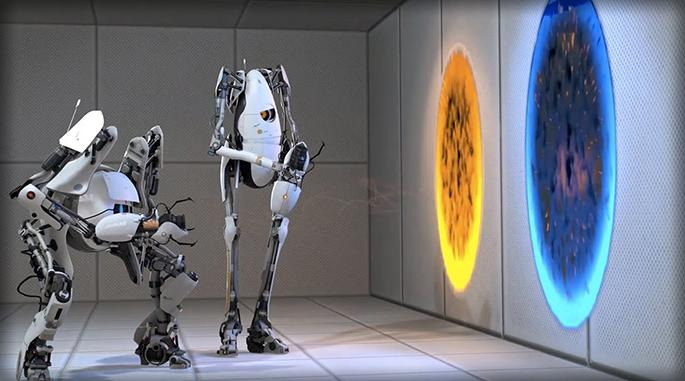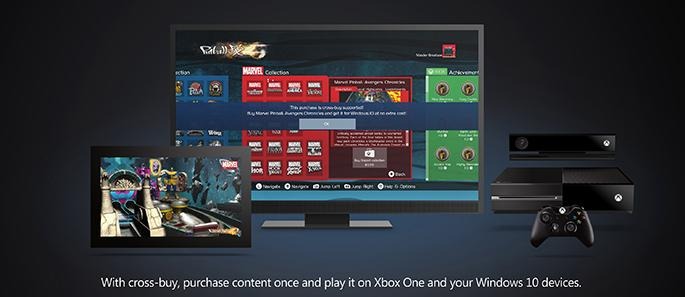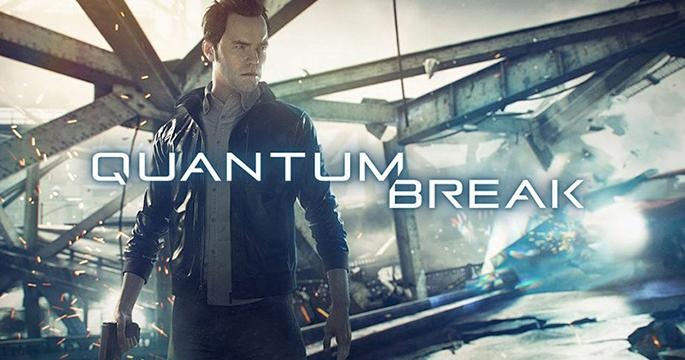What Microsoft's cross-buy initiative means, and why it's good for gamers
Imagine picking up a new game, and spending hours playing it on your couch. Then, maybe your couch is occupied by other people watching movies. Well, you have a perfectly good PC in the other room, so you go fire it up, and continue where you left off. You don't have to worry about buying another copy, or setting up streaming, it just works. This is a future that Microsoft is looking at making a reality, though not everyone is happy about it.
Now that our consoles are basically just pre-built, specialized PC's, this sort of thing was inevitable, really. Sure, we've had games that you could buy for one or the other for many years now, and some of us have always wondered "why do I need to pay for the same game twice?" Of course, the answer to that gets pretty complicated. Consoles and PC's have been fairly different until this most recent generation, so there's a lot of extra work that goes into porting the game from one platform to another. Plus, just because the experience is mostly the same, with better visuals, doesn't mean that we all didn't have to re-buy Star Wars on Blu-ray or DVD when we already owned the VHS tapes.
Of course, there have been times where publishers are happy to go ahead and offer a solution to this problem. Back when Portal 2 was released on the PS3, you also received a copy of the game for your PC. I don't have any figures in front of me, but I don't think that the move bankrupted Valve. In fact, Valve is practically the poster-child for cross-buy.

A few years back, Valve made a big push to bring games to the Mac platform. After all, why should Windows be the only desktop OS capable of playing most games? The announcement included the news that their entire library would not only be playable on OSX, but you wouldn't need to re-purchase any of your existing games. If you purchased a copy for one OS, you would be able to play it on the other.
To this day, if you buy a game on Steam, you get a copy for every OS that it is available on. This isn't even limited to games developed by Valve. Even earlier today, Capcom announced that they were developing a version of Street Fighter V for SteamOS and other Linux distros. The Linux versions of the game would be free for anyone who purchased a copy of the game on Steam, despite the fact that a good deal of development needs to go into making a AAA title playable on Linux.
So last week Microsoft made waves when they announced that Quantum Break would not only be available on the PC, but that if you pre-ordered the game on the Xbox One, you would get the PC version for free. You would even be able to use your saves between the two different platforms. As someone who owns both an Xbox One and a gaming PC, this was exciting news.
Now those of you with a PS4 and a PS Vita are probably wondering what all of the fuss is about. After all, this sound pretty familiar. You can buy a game for your PS4, and play it on your Vita without even needing to turn on your console. And you're right, as I said before with my example with Mac and Linux versions of games, this is not a new concept.
So why now?

Windows 10 is a big change for Microsoft. They have had a fractured platform for many years, with no real sense of connection between their different devices. However, with Windows 10, they essentially have the same OS running on all of their devices. They've started rolling out universal apps that have the same experience across PCs, tablets, phones, and even the Xbox One. And what is a video game, but a very big app?
So now that they have this universal platform, it makes sense that Microsoft wants to start blurring the lines between the PC and Xbox One. With a good portion of the technological hurdles out of the way, they can now offer something to their user base that no one has really been able to offer before: A seamless way to play games on either platform, without adding an additional cost to the equation.
What's curious though, is that since Microsoft announced that they were planning to make cross-buy and cross-save a platform feature, there has been some backlash. Who would be upset about getting a free copy of your game for the PC? Fanboys, of course.
Fanboys might seem like a derogatory term, maybe fanatic is better? Either way, we're talking about a group of people who is very passionate about their chosen platform. So passionate, that they would get up in arms at the thought that a game would no longer be exclusive to their console of choice. This is a real thing that has been happening. You see, Quantum Break was originally an Xbox One exclusive game. And people are taking offense to the idea that you will suddenly be able to play it on a PC. This is perhaps the most absurd argument I've ever heard. Because if you want to get down to it, the game was always going to be available on PC.

When Microsoft updated the Xbox One to run Windows 10, they added in a pretty cool feature. You can actually stream any game from your Xbox One to your Windows 10 PC, so long as they're on the same network. So every single Xbox One game is and will be available on the PC in some fashion. Every title, no matter how exclusive is now playable on the PC.
The difference with cross-buy is twofold. First, it's a matter of convenience. Now you don't have to make sure that your Xbox is free to stream the game you're playing to your PC. If someone else is gaming on your Xbox, or is watching a Blu-ray, streaming isn't possible. With cross-buy, this issue is eliminated.
The second difference is about customization. The Xbox One has a very specific set of hardware inside of it. Games are optimized to take full advantage of that hardware, and they play well. However, if you have a gaming PC, you customize many parts of your gaming experience, including running the game with higher graphics settings. If I'm streaming an Xbox One game to my PC, the game is going to look exactly the same as it did on my TV. However, if I'm running the game on my PC, I'm going to be able to bump up those graphics to make the game look even better.
This move is a win for Xbox gamers and PC gamers alike. I'm personally a PC gamer, but now I've got access to Xbox exclusive titles, without even needing to own an Xbox. Xbox owners that decide to invest in a gaming PC won't have to worry about re-buying their favorite games, because they'll already have them for the PC. And Xbox gamers that continue only playing on their Xbox One will see absolutely nothing different. They will buy their games, and they will have a PC copy that they never use.
In short, there is absolutely no reason for Xbox One gamers to be upset about cross-buy. The feature already exists, and has for months. We're just getting the ability to run the game on the PC, instead of using the Xbox to do it. Xbox One exclusives don't exist anymore. Windows exclusives are all there are.
